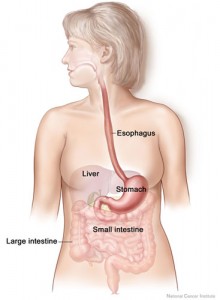Risk Factors
No one knows the exact cause of stomach cancer, but some factors may put you at higher risk. These include:
- Age—You can get gastric cancer at any age, but may be more likely after the age of 70
- Poor diet consisting of eating foods which are smoked, salted, or pickled
- Lack of physical activity
- Obesity
- Smoking
- Family History
- Infection called H. pylori (Helicobacter pylori) which causes inflammation and ulcers
- Long-term inflammation of the stomach
- Having had part of the stomach removed
Symptoms
Early gastric cancer often has no symptoms, but some people may experience:
- Discomfort or pain in the stomach area
- Difficulty swallowing
- Nausea and vomiting
- Unexplained weight loss
- Feeling full or bloated after a small meal
- Vomiting blood or having blood in the stool
Detection

If you have any previously mentioned risk factors or symptoms, you can discuss them with your healthcare provider at your next visit, or proactively schedule an appointment. If your healthcare provider determines that further examination is necessary, he or she may administer the following tests:
Physical exam: The provider feels the abdomen for fluid or swelling. They will also check for swollen lymph nodes.
Endoscopy: Your provider uses a thin, lighted tube (endoscope) to look in the stomach by passing it through the mouth and esophagus. The endoscope can be used to remove tissue for testing.
Biopsy: A pathologist uses a microscope to check the tissue sample for cancer cells. A biopsy is the only sure way to know if cancer cells are present.
